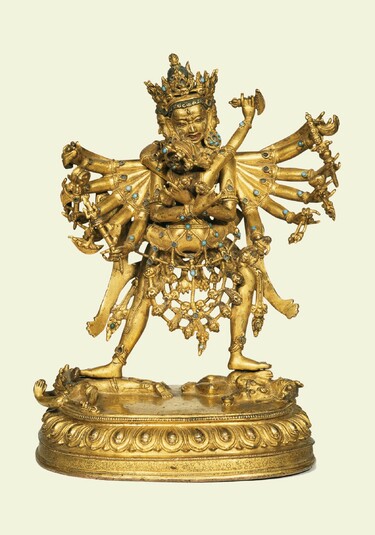
Item: Chakrasamvara (Buddhist Deity)
| Origin Location | Tibet |
|---|---|
| Date Range | 1400 - 1499 |
| Lineages | Buddhist |
| Size | 20.80cm (8.19in) high |
| Material | Copper |
| Collection | Private |
Classification: Deity
"...Shri Chakrasamvara with a body blue in colour, four faces and twelve hands. The main face is blue, left face red, back face yellow and right face white. Each face has three eyes and four bared fangs. The first two hands hold a vajra and bell embracing the mother. The lower two hold an elephant skin out-stretched; third right a damaru, fourth an axe, fifth a trident, sixth a curved knife. The third left holds a katvanga marked with a vajra; fourth a vajra lasso, fifth a blood filled skullcup, sixth carries the four-faced head of Brahma. The right leg is straight and presses on the breast of red Kalaratri; left bent and pressing on the head of black Yama. The hair is tied in a topknot on the crown of the head; on the crest a wish-fulfilling jewel ornament and crescent moon. The soft spot at the top of the head is marked with a vishvavajra. Each head has a crown of five dry human skulls; a necklace of fifty fresh heads and six bone ornaments; wearing a lower garment of tiger skin; possessed of the nine emotions of dancing; grace, fearlessness and ugliness; laughter, ferocity and frightfulness; compassion, fury and peacefulness."
"In the lap is the Mother Vajravarahi, with a body red in colour, one face, two hands and three eyes. The left holds a blood filled skullcup embracing the Father and the right a curved knife in a threatening gesture pointed in all directions. The hair is worn piled on the head; a crown of five dry human skulls and fifty dry as a necklace. The left leg is straight and right bent, embracing the Father. Both Father-Mother stand in the middle of a blazing fire of pristine awareness." (Written by Jamyang Khyentse Wangpo (1820-1892). The Collected Works of the Great Jamyang Khyentse Wangpo, vol.7, fol.215-226. Gyud de Kun Tus, vol.25, folios 11-19. [Translated October 14, 1989]).
Jeff Watt [updated 6-2019]
Buddhist Deity: Chakrasamvara Art History
Artist: Sonam Gyaltsen & Atelier (Ishtadevata)
Tibet: Tsuglakang Temple (Deities)
Tibet: Tsuglakang Temple, Lhasa (Visual Dharma)
Buddhist Deity: Chakrasamvara (Sculpture)
Buddhist Deity: Chakrasamvara (Sculpture Masterworks)
Artist: Sonam Gyaltsen & Atelier (Sculpture)
Artist: Sonam Gyaltsen & Atelier (Wrathful Figures)
